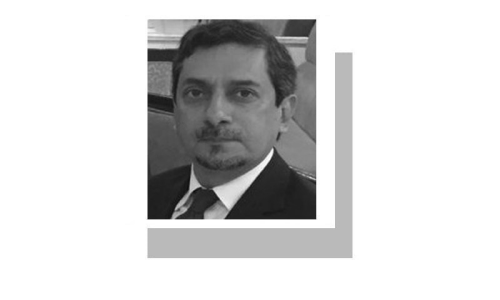A "black day" was observed and anti-India demonstrations were held in Azad Jammu and Kashmir on Sunday as Indian Prime Minister Narendra Modi visited occupied Jammu and Kashmir in what was his first visit to the disputed territory since New Delhi revoked special status nearly three years ago.
New Delhi nullified the area's special status in August 2019, when authorities arrested thousands and imposed the world's longest internet shutdown, seeking to forestall local opposition to the move.
Tight security was in place for Modi's appearance at Palli village in Jammu, the Hindu-majority southern part of the territory, which celebrated New Delhi's introduction of direct rule as a defence against Kashmir's freedom movement.
Sunday's event marked Panchayati Raj, a day that commemorates grassroots democracy — although occupied Kashmir has been without an elected regional government since 2018.
There was a complete shutdown in occupied Kashmir, the official Pakistani press agency APP reported. The call for the strike was given by the All-Parties Hurriyat Conference.
In Azad Kashmir, demonstrations were held on the call of AJK Prime Minister Sardar Tanveer Ilyas yesterday.
Today, a large "black day" protest rally was held in the capital Muzaffarabad and led by AJK minister Khawaja Farooq Ahmed and representatives of other political parties. The rally started from Burhan Wani Chowk and ended at Ghari Pin Chowk. Apart from banners with anti-India and pro-independence slogans, the participants also held black flags and chanted slogans against Modi.
Addressing the participants on the occasion, Khawaja Farooq Ahmed said the protesters wanted to convince the international community through demonstrations that Kashmiris never recognised the Indian occupation and the arrival of a person like Modi — whose "hands are stained with the blood of innocent Kashmiris" — in any part of the territory was a "highly undesirable" thing for them.
He called on the international community, especially the United States and the United Kingdom, to sever their relations with India, as they had done with Russia over the war in Ukraine. He lamented the "double standards" of the international community in the case of Kashmiris.
Ahmed said that the UN and the international community should press India to give Kashmiris their right to self-determination. He said that India-occupied Kashmir was under a continuous curfew in which people's livelihoods were being destroyed under a "premeditated plan" so that they could not raise voices against India.
He also expressed gratitude to the institutions and people of Pakistan for always supporting Kashmiris.
Ahmed said that the day was not far when Kashmiris would become independent and a part of Pakistan.
Mushaal Hussein Malik, the wife of Jammu Kashmir Liberation Front chairman Yasin Malik, said that Modi's visit was "nothing but a cruel joke with the Kashmiri people", according to APP.
She vowed that the brave people of Kashmir would observe a complete shutdown on Modi's visit to give a clear message to him as well as to the world that Kashmiris would not accept brutal subjugation anymore.
At the end of the rally, prayers were offered for the independence of the occupied territory.
Tight security in Jammu
Indian authorities deployed troops and police personnel across the occupied territory, particularly in the Jammu region, as security measures ahead of Modi’s visit.
According to state-run APP, Indian personnel conducted random checking of vehicles and frisked passengers at checkpoints which mushroomed on the roads of all major cities and towns as well as the Srinagar-Jammu highway.
Indian police and troops used CCTV cameras to keep a watch on the movement of people. Sharpshooters were also deployed at high rise buildings while drone cameras and sniffer dogs were included in service. Indian police seized scores of bikes from different areas of Srinagar.















































